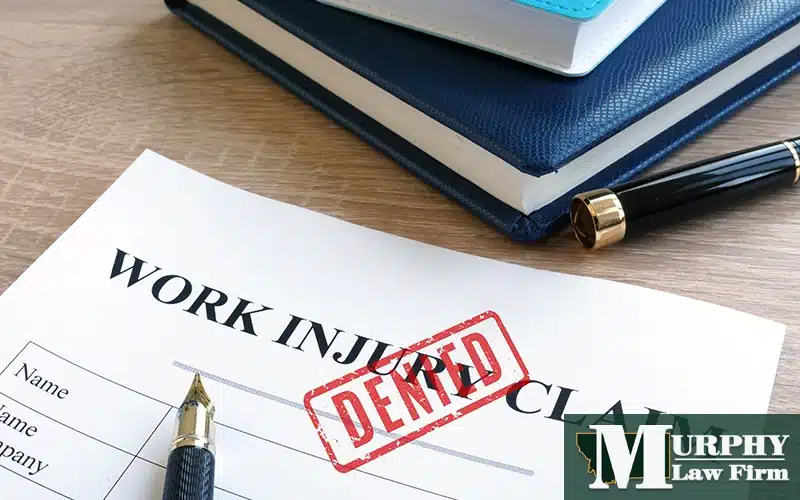
After being injured on the job, many people rely on workers’ compensation benefits to help with medical expenses and lost wages. This money can be a lifeline for workers while they’re recovering from a serious injury. Sometimes, however, workers are wrongly denied these benefits, which can lead to significant stress and financial hardship.
If you’ve recently suffered a work-related injury, illness or disease and were denied workers’ compensation benefits after filing a claim, it’s important to understand that you have the right to file an appeal. However, the process of appealing a denied claim can be complex, so it’s crucial to follow the necessary steps, which we’ll outline below.
If you’d like help filing an appeal or if you have additional questions after reading this article, reach out to the experienced Montana work injury attorneys at Murphy Law Firm for a free consultation.
Why was my workers’ comp claim denied?
There are many reasons for a denied workers’ compensation claim, some of which are valid, like failing to notify the employer within 30 days of the injury, and some of which are not.
Employers and insurance companies often resort to several common excuses to wrongfully deny workers’ compensation claims. One frequent argument is that the injury was not work-related or occurred outside of work hours, challenging the claim’s validity. They may also assert that the injury was idiopathic or pre-existing and not exacerbated by workplace activities.
Regardless of why an employer denies a claim, they’re required to provide the injured worker with a claim denial letter specifying the reason(s) the claim was denied. The goal of filing an appeal will be to disprove the assertions in the claim denial letter and prove that your injury is valid.
Common tricks used by Montana workers’ comp insurance adjusters
Watch out for these common workers’ comp insurance adjuster tactics used to reduce or deny your claim.
Steps to appeal a denied workers’ comp claim
If you suspect that your workers’ comp claim was wrongfully denied and you would like to file an appeal, it should be done as soon as possible after receiving the claim denial letter. Because time is limited and the appeal process can be challenging, it’s best to get the wheels in motion sooner rather than later.
Below are the general steps for appealing a denied workers’ comp claim in Montana.
Step 1: Send a letter to the insurance company
Before you can move forward with the process of formally appealing your claim, you need to send a letter to the insurance company. This letter should explain why you disagree with the denial of your claim and the workers’ comp benefits you believe you’re entitled to.
If you do not hear back from the insurance company within 15 days or if they deny your request, you can move on to the next step, which is to request a mediation conference.
Step 2: Request a mediation conference
Before filing a workers’ compensation benefit dispute with the Montana Workers’ Compensation Court (WCC), parties must first undergo a mediation process managed by the Dispute Resolution Section of the Montana Department of Labor & Industry.
This mediation conference is a confidential meeting between the disputing parties, facilitated by impartial mediators. The goal is to reach an amicable resolution or agreement, which can vary from a complete settlement to a negotiated compromise. If mediation doesn’t successfully resolve the issues, the mediators provide a written recommendation.
To request a mediation conference, you must fill out and submit a Petition for Mediation Conference form to the Montana Department of Labor & Industry Dispute Resolution Section. Before the conference, all involved parties will be sent a “Notice of Mediation Conference” letter, which includes the scheduled date and time for the conference. These conferences can be held virtually or in person at your request.
Step 3: Petition for a hearing
If you or your employer and their insurance company reject the recommendations of the mediator, you can then file a Petition for Hearing form with the Montana Workers’ Compensation Court. This must be done within 2 years of the initial denial of your claim.
A scheduled hearing will allow both sides to present their respective cases and a judge to review the disputed details. The judge will then make a ruling.
Step 4: Appeal to the Montana Supreme Court
If the Montana Workers’ Compensation Court judge does not rule in your favor, you can appeal the decision to the Montana Supreme Court. The Montana Supreme Court will review the judge’s decision and determine whether or not it should be upheld.
Wrongful (unlawful) termination due to a work injury or workers’ comp claim
Can you be fired for filing a workers’ compensation claim in Montana?
FAQs
What types of workers’ comp disputes qualify for mediation?
Generally, any disagreements between a claimant (injured person) and the insurance company regarding benefits under Montana’s Workers’ Compensation Act are suitable for mediation. This includes disputes over issues like:
- The extent of injuries
- The amount of benefits due
- The coverage of specific medical treatments
However, there are certain situations where mediation may not be applicable. If you’re uncertain about whether your specific dispute qualifies for mediation under the Workers’ Compensation Act, it’s advisable to seek advice from a work injury attorney so you can understand your options.
Do I need an attorney to file an appeal for a denied workers’ comp claim in Montana?
While it’s not a legal requirement to have an attorney to file a denied workers’ compensation claim in Montana, it’s highly recommended. Navigating the complexities of workers’ compensation law can be challenging, especially when dealing with a claim that’s already been denied.
An experienced attorney can provide invaluable assistance by ensuring that all necessary paperwork is correctly filed and advocating on your behalf during negotiations or appeals. They can also help identify and gather the evidence needed to support your claim.
Additionally, an attorney can represent you in hearings or court proceedings if your claim escalates to that level. Their expertise often increases the likelihood of a favorable outcome, making their involvement a wise decision for anyone pursuing a denied claim.
What do I need to do to prepare for a mediation conference?
To effectively prepare for a mediation conference, it’s important to gather and submit all relevant documentation supporting your position at least 1 week before the conference. This documentation should include any medical records, accident reports, correspondence with the insurer, and any other material pertinent to your claim.
Before the conference, take some time to clearly outline your concerns and the key points you want to discuss. Writing down these points can help you stay focused and ensure you cover all the relevant topics during the mediation. This can include details about the injury, its impact on your life, any disagreements regarding the benefits, and what you believe a fair resolution would be.
Additionally, familiarize yourself with the mediation process and what to expect during the conference. Remember, the goal of the mediation is to find a mutually agreeable solution, so be prepared to listen to the insurer’s position and consider compromise where appropriate, while still advocating for your own needs and rights.
It may also be beneficial to discuss your case with an attorney or a legal advisor who can provide insights into the strengths and weaknesses of your position and offer advice on effective negotiation strategies. They can help you understand the legal aspects of your case and assist in formulating a clear and persuasive argument.
Was your Montana workers’ comp claim denied? Murphy Law Firm can help.
If you have questions about the appeal process or would like help appealing a denied workers’ compensation, contact the knowledgeable workers’ compensation attorneys at Murphy Law Firm today.
With more than 75 years of combined experience, our attorneys know how to build a successful workers’ compensation case, so you can rest assured that your appeal will be handled with the utmost care and expertise. We understand the complexities of workers’ compensation laws in Montana and are dedicated to ensuring that your rights are fully protected.
Want to learn more about how we can help you? Get started today by scheduling a free consultation.
References
Montana Workers’ Compensation Claims Assistance. (n.d.). Erd.dli.mt.gov. Retrieved December 6, 2023, from https://erd.dli.mt.gov/work-comp-claims/





